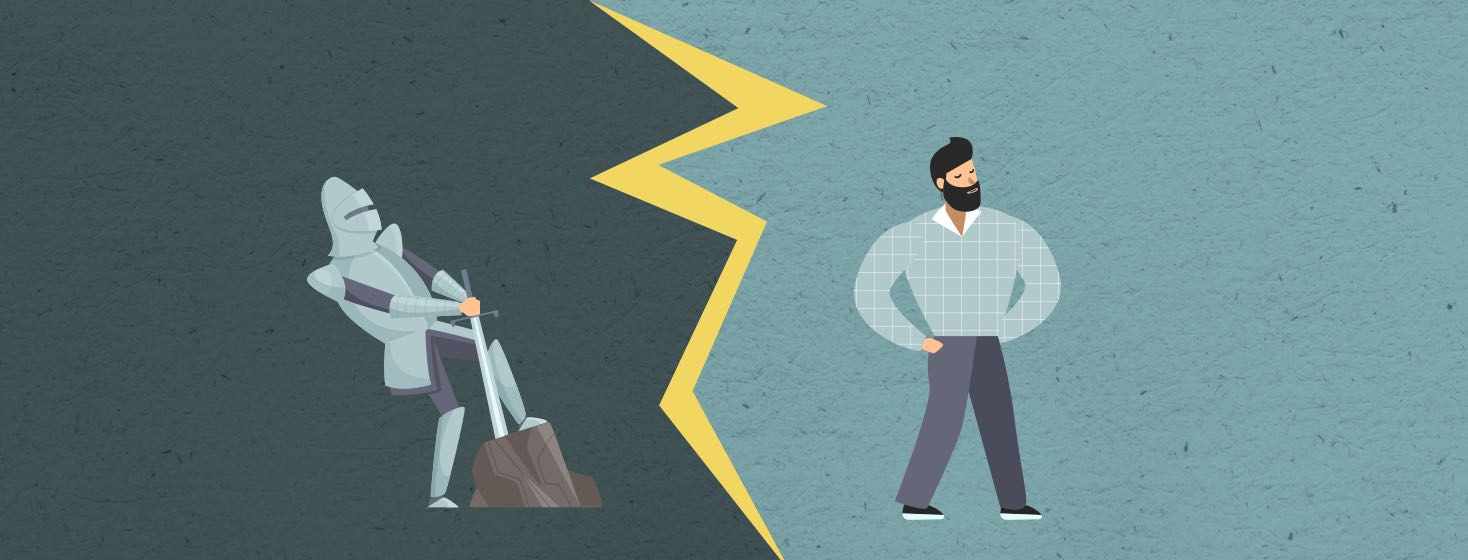Don't Call Me a Warrior
I am called a "warrior" fairly often these days. I am not a warrior. People also call me "heroic," "strong," and even "brave" just for getting up in the morning and going about my day. I appreciate the sentiment, but none of that describes what I am going through or how I feel inside.
Does having cancer make me a warrior?
This is my personal perspective and I do not fault people who use the banner of "warrior" to bolster their own resilience. I understand that it can be a useful psychological tool. And for some, surely it takes a near-insurmountable level of determination just to rise in the morning and face even a small corner of their world -- and they deserve the stripes of warpaint for making the effort.
But no matter how I parse it, I cannot come up with a scenario in which being diagnosed with a terminal disease suddenly turns me into a noble creature. Nor do I see the benefit of being held up as an example of fighting spirit for simply resigning myself to go about my day in as normal a manner as possible. Truthfully, the expectation placed upon me is simply additional stress, the added burden of now feeling like I have to live up to someone else's idea of how I am "attacking" an "enemy" that does not really exist.
Anthropomorphizing a disease may make it easier for some people to come to terms with the process of going through treatment, but it does nothing to help the greater understanding of the disease or changing the stigma associated with it. Couching the "battle" against cancer in terms of war misrepresents the process of how successful medical care actually works. And it pushes patients into pockets of winners and losers, heroes and cowards; the dead are buried with Purple Hearts or lie in mass graves of disgrace.
Cancer is about endurance
Living with advanced, metastatic cancer is not about fighting or winning. It is about endurance and resignation. How we choose to present ourselves to the world, whether with smiles or tears, is a personal matter, but does not change the realities of treatment. And I cannot stress this enough: people who die from lung cancer -- or any cancer, for that matter -- did not "lose their battle." It is not because they did not fight hard enough. It is not because they were weak. People die from cancer because people die from cancer.
And stop martyring victims as if they are fallen warriors in a crusade against insurmountable evil. There is no evil in a cancer cell -- these cells are every bit a natural part of us as any other cells we have, regardless of how much we may hate them. But spreading this skewed narrative distracts from the fact that cancer cells have no conscious directive. Cancer cells do not intend to kill us -- in fact, they need us to survive, and pretending that they have intention is both distracting from proactive treatment and slightly insidious in the psychology of believing that a part of us inside wants to kill us. Language matters and these stories we tell are neither healthy nor helpful.
We all carry the same strength
I am happy that some find my approach to treatment inspiring. It is a great privilege to have helped strangers overcome their fears of medical intervention. But I do this as an ordinary man, dealing as it is with somewhat lousy circumstances over which I have little control and minimal choice.
People have said to me that they could never do what I do, that I am a "powerhouse" or a "beast" or some other euphemism of extraordinary willpower and strength. But the truth is that, if it came down to it, there is no reason to believe that those same people could not walk the same path as me. It only seems insurmountable because they have not walked it on their own. It only appears impossibly rocky from a distance. And while on the path, if it does sometimes look too steep to continue up ahead, facing down at each step and continuing to put one foot in front of the other eventually gets us further along where we need to be.
I want to be understood
Please do not call me a "warrior." If you need to compliment me, compliment my determination or my commitment to continue with life-saving therapies in spite of their side-effects. Do not compare my daily struggles to a lone hero facing an advancing battalion. It both hyperbolizes and minimizes my actual situation. As a cancer patient, I do not want to be lionized. I just want to be understood.
Editor’s Note: We are extremely saddened to say that on October 21, 2018, Jeffrey Poehlmann passed away. Jeffrey’s advocacy efforts and writing continue to reach many. He will be deeply missed.

Join the conversation